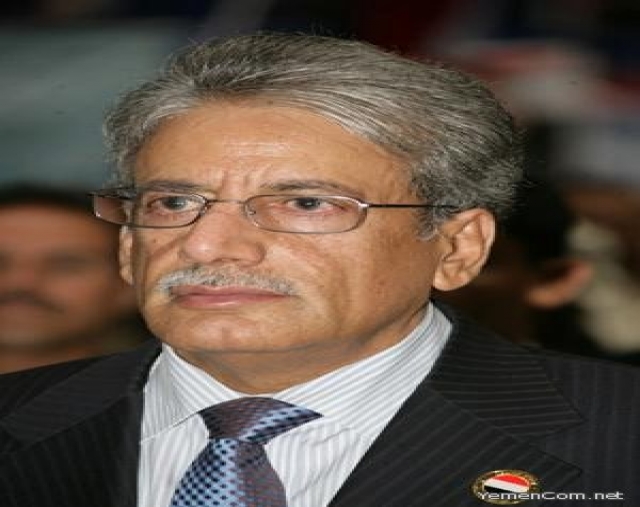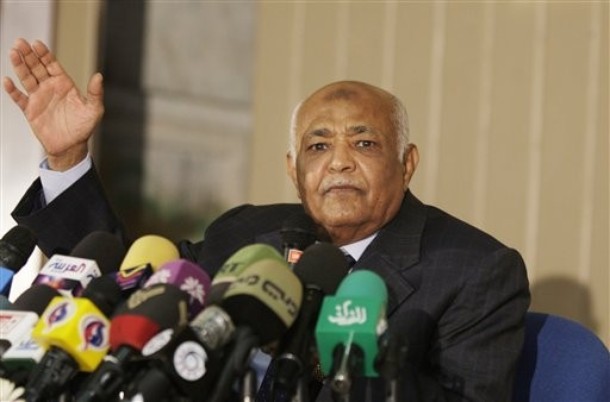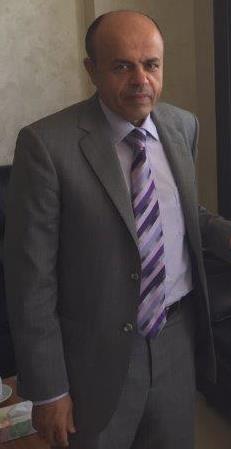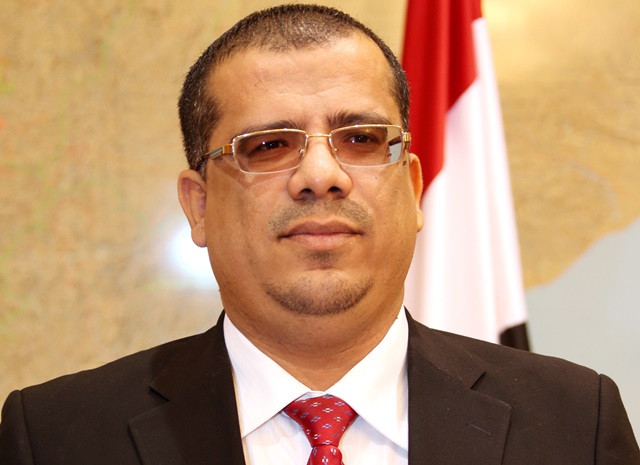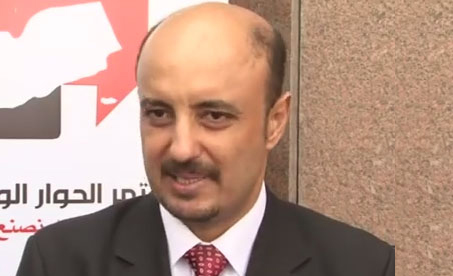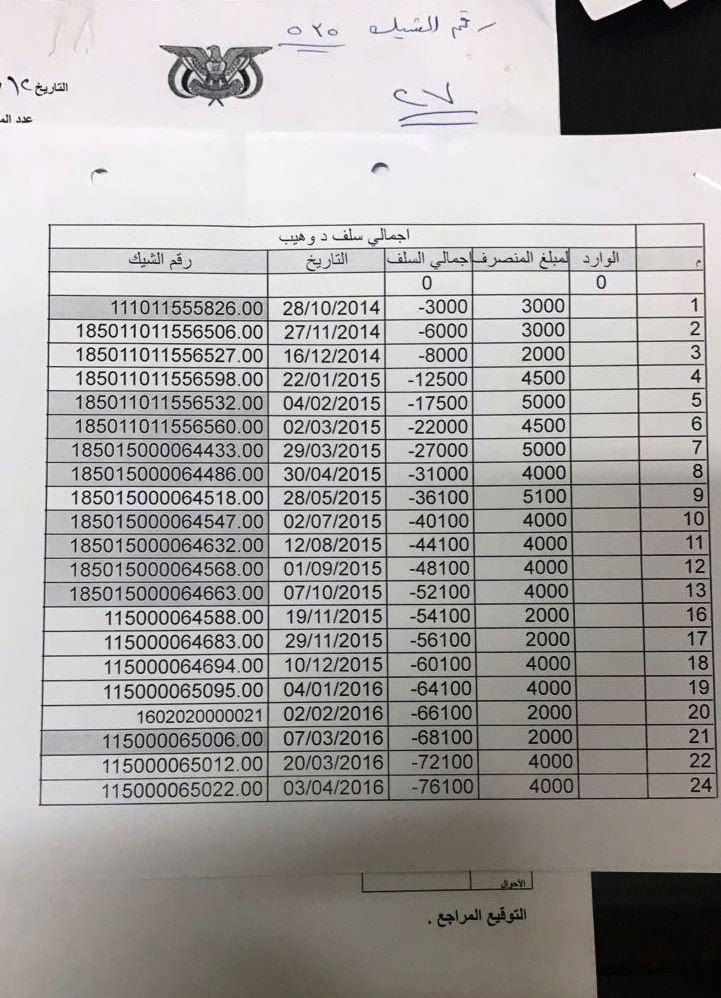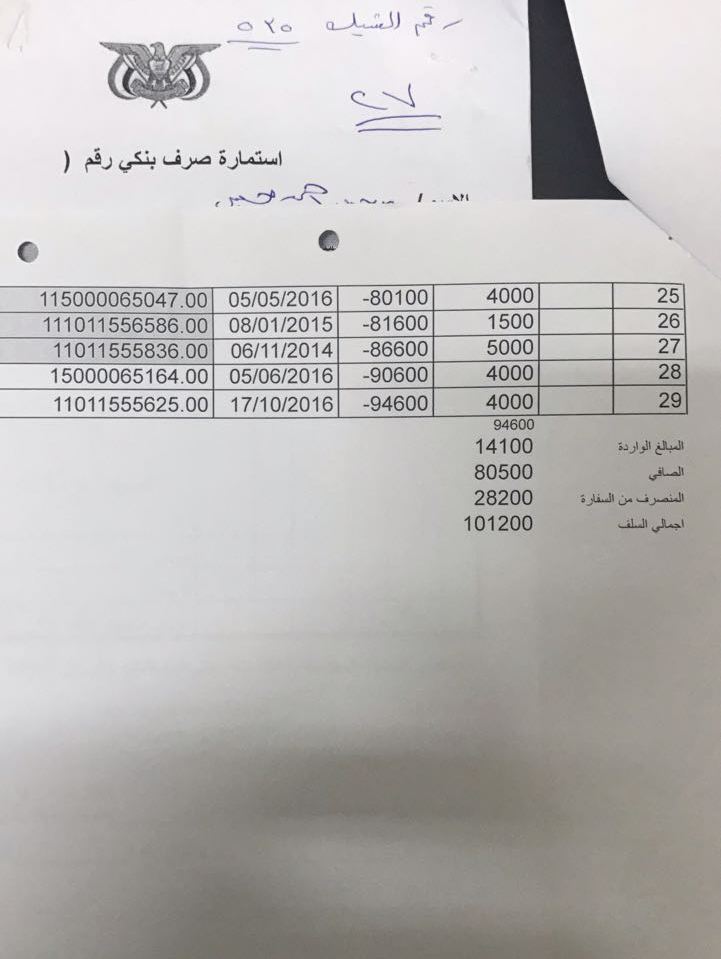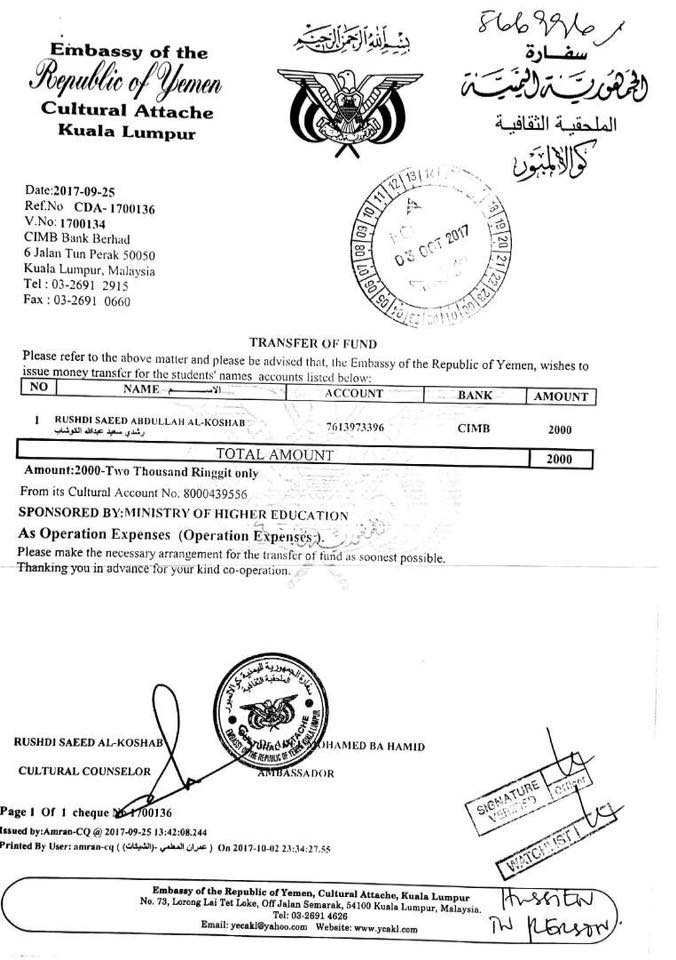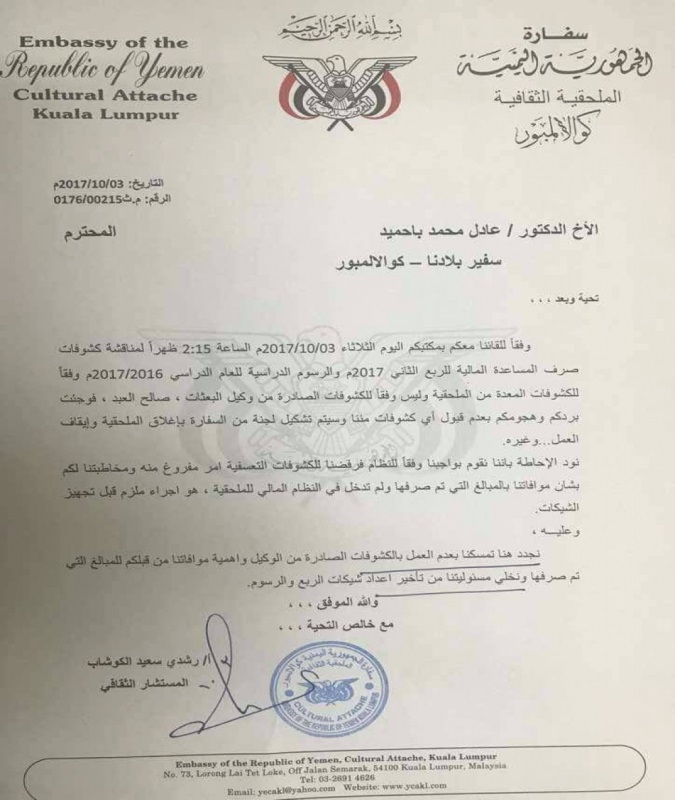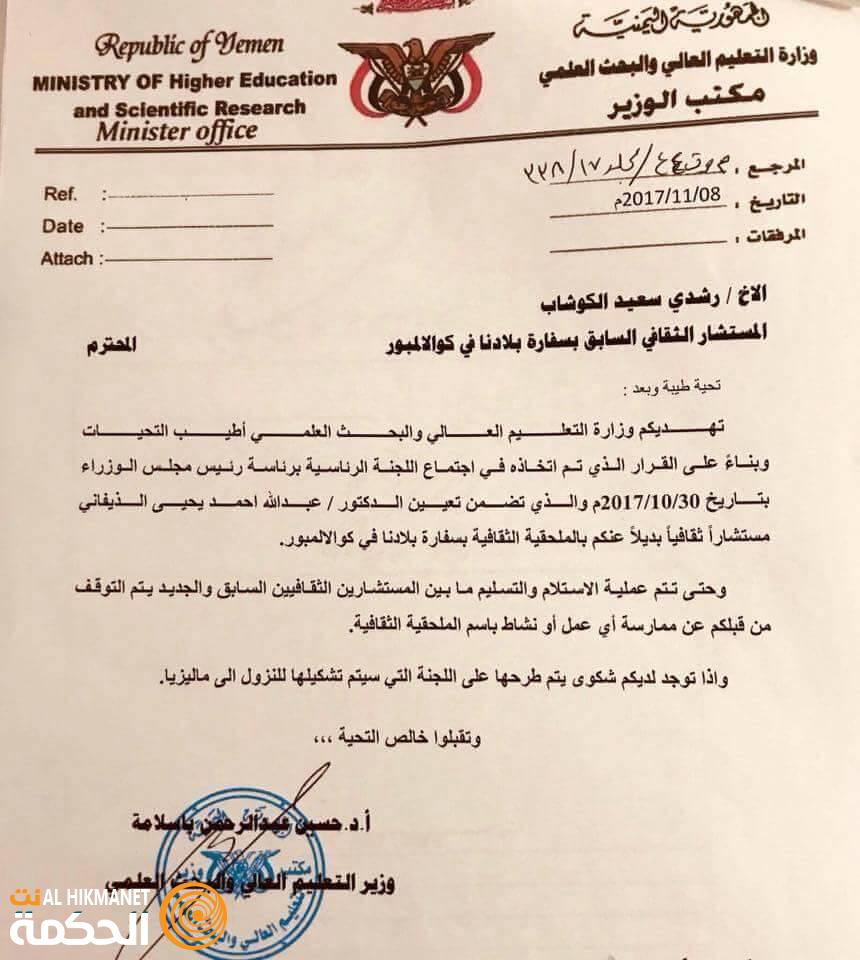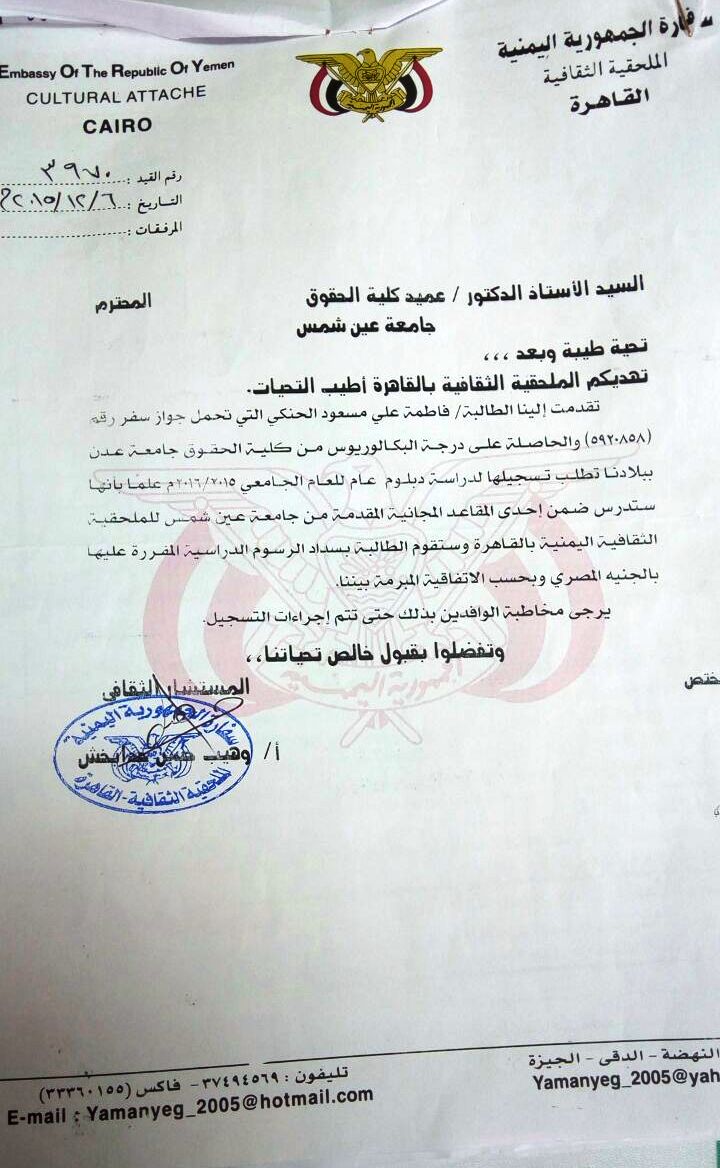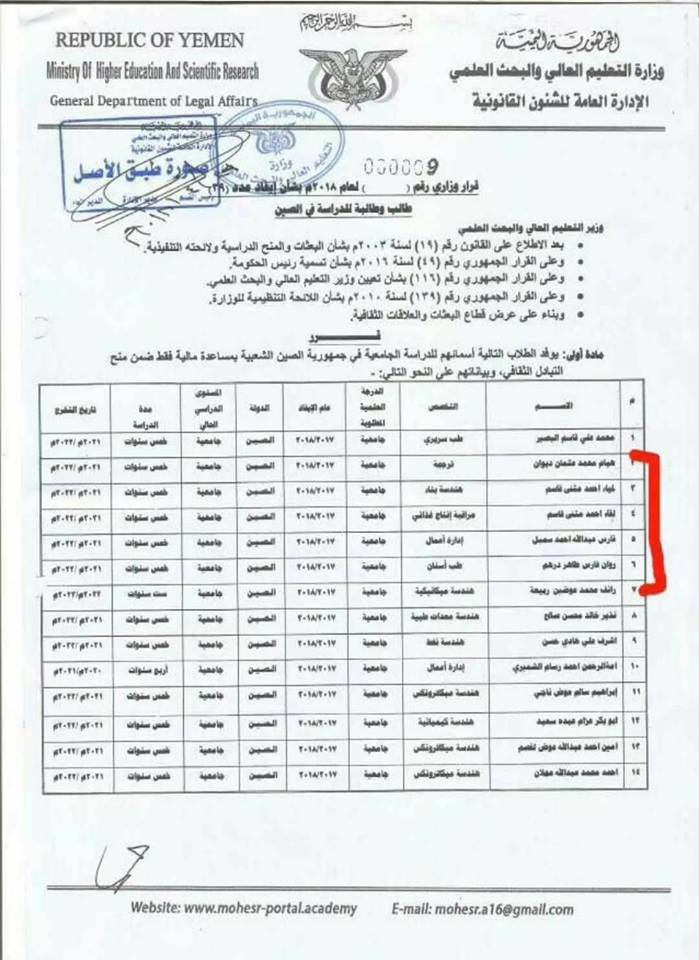A series of investigations conducted by journalist Hassan Al-Bayti
Between misery and happiness...the life of scholarship students
Yemeni students abroad are spending their summer vacation facing a crisis of delayed financial dues, some of them being dropped from scholarship lists, or some of them failing to graduate. These images are conveyed to us by the “Yemeni Students Abroad” page on Facebook, where students’ protests in several countries appear in front of the Yemeni Cultural Attaché. In the face of trying to find the reasons and solutions to this problem, we remain in a circle of mutual accusations between the Yemeni embassies and their cultural attachés, and between the Ministry of Higher Education, the Ministry of Foreign Affairs, and the Ministry of Finance, as each of them accuses the other of causing the suffering of the students. The Yemeni street in particular, and officials of foreign countries, stand perplexed in the face of this crisis, as some Jordanian, Malaysian, Russian and other universities have warned Yemeni students of expulsion unless they pay tuition fees. On the other hand, the phenomenon of student labor has spread in order to earn a living in light of the delay in their financial dues. The roots of the crisis began to appear after the late President Ali Abdullah Saleh stepped down from power. The crisis was formed initially by the Basindawa government, then by the government of Bahah, leading to two governments: the legitimate government led by Bin Dagher, and the Houthi government led by Bin Habtoor. Amidst all these governments, there is a partisan squabbling between them, with each accusing the other of causing the students' suffering.
On the other hand, students on scholarships from foreign governments are among the luckiest of the more than ten thousand Yemeni students sent to 32 countries to study at all levels of university. Other lucky individuals are students from the Charitable Fund for Supporting Outstanding Students and the Hadramout Foundation for Human Development, which is led by Saudi businessmen of Hadrami origin, and which covers vast areas of eastern and southern Yemen.
If we delve deeper into both directions, we will find the difference between them and the reason behind the unhappiness of some and the happiness of the other.
The issue has attracted the attention of local and international media outlets, including satellite channels (Yemen Shabab, Belqis, Sana’a, Al-Sharia, and Al-Jazeera) and newspapers such as Yemen Press, Al-Mashad, and “Min Al-Dakhil Al-Malaysi.” The recent protests, some of which were directed against security forces, have angered the Yemeni street towards the legitimate government and its treatment of students, as well as the Houthis’ looting of students’ dues from the Central Bank under the pretext of “war efforts.”
All we want to know in this investigation is: Who caused the crisis that began in 2010 and reached its worst point in 2018? Is private support a temporary alternative to government support amid the war in Yemen and the suspension of air traffic to many countries? What is the role of struggling students in this crisis? Is it true that students are part of the problem?
Under Basandwa's government, the legacy of corrupt people and the corruption of notables overshadows the legitimacy of the state. Students contract with embassy regarding financial corruption
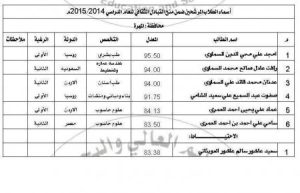


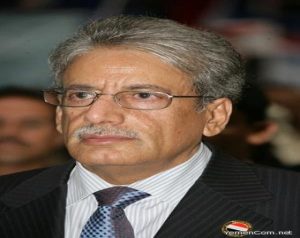
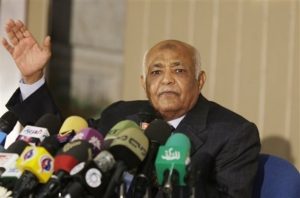
When the Basindawa government took over the reins of power in Yemen based on the Gulf Initiative, and since they had a footprint in the National Dialogue Conference, which requires efficiency in fair distribution between the regions, we found the opposite. The Hadhramaut region, with its four governorates, was given 52 grants in 2014, and the Azal region 137 grants, knowing that the best region in which the educational plan was implemented is Hadhramaut, according to the statement of Al-Ashwal - the former Minister of Education - there are influential people in the Yemeni authority whose children, high school graduates, suffer from diarrhea in grades to good or very good. These are presented over competent, distinguished students who are qualified to study abroad, because they are the children of officials. This is what happened with the grants provided to the Hadhramaut region (Al-Mahra Governorate), where grants were taken from it for the benefit of the children of influential people from the (Samawi)
This implementation is one of the reasons that started the unhappiness of the scholarship students, as the Basindawa government’s decision came on 2/13/2014 to stop financial support for the scholarship students in Malaysia, as the newspaper reported: From inside Malaysia Ahmed Al-Rubaie, Director General of Scholarships and Fellowships in Yemen at the Ministry of Higher Education and Scientific Research, said: The standard of education at private universities in Malaysia is lower than that of public universities, and tuition fees at private universities are three times higher than those at public universities.
He said that the cost of studying in a public Malaysian university is approximately (US$1,500) (RM5,000) per year, while the cost of private university education is around (US$1,450) (RM15,000), and spending is on 9,000 Yemeni students, including four thousand in private universities, and the government can only cover $1,500 with the monthly salary for each academic year.
So here's the question: Why did the government announce the suspension of financial support for students in Malaysia, and did it know about the four thousand?
I spoke to an academic who was sent abroad before and after Yemeni unification, who preferred to remain anonymous. He said that the reason behind the recent decision is the corruption perpetrated by the embassy in Malaysia along with some students. The student travels to Malaysia without knowing where the university he intends to attend, but he knows the tuition fees at public and private universities. Representatives of the Yemeni embassy in Malaysia are waiting for him to decide on the university he wants. This student requests to study at a private university for $4,500 annually, and the embassy hands him the money or in some other way makes him the one who pays the tuition fees. Then the student studies for the first year at the private university, then transfers in the second year to a public university for $1,500 annually, thus benefiting from $3,000 annually, divided between him and the embassy staff.
Al-Rubaie and his office staff have a role in corruption. On October 24, 2010, the Yemeni newspaper “Nabaa News” reported, citing an official in the Ministry of Higher Education and Scientific Research, that an armed gang led by a student who had failed his studies outside Yemen and whose scholarship had recently been cancelled had kidnapped the Director General of Scholarships at the Ministry of Higher Education, Ahmed Al-Rubaie, in the Shamlan district of the capital. They took him to a deserted place outside the capital and left him gagged and tied up for a whole night before he was able to crawl out of the building where he was placed to seek help from the residents of the area.
According to sources close to the scholarship official, the kidnappers demanded the return of the scholarship of a struggling student studying abroad, Shaker Saleh Mutahhar Thawabih. They threatened to kill him and his family, telling him that what had happened was a message to the Minister of Higher Education and the committee tasked with reviewing and correcting the conditions of students studying abroad. The student had been studying in Jordan since 2003, majoring in financial and banking sciences, and his financial aid had been suspended since the first quarter of 2010.
Here, we prove the validity of what we say, that the student is a partner in corruption alongside the Ministry of Education. How can financial dues be paid to a student like this who has spent seven years in his specialization, especially since we have examined the specializations in Jordanian universities and found that the maximum period for specialization is four regular years.
Here are old statistics from the Ministry of Higher Education, from January 2009 to September 30, indicating that there were approximately 2,056 students failing. This is a legacy inherited by the Basindawa government following the 2011 Yemeni protests.
Here comes the question again: Hasn't the government taken the initiative to recognize this reality, or at least cleanse the Ministry of Higher Education of the corruption that caused this tragedy?
Several Yemeni newspapers reported in 2012 that the Minister of Higher Education in the Basindawa government, Dr. Yahya Al-Shuaibi, conducted a survey at the Ministry of Higher Education on the most corrupt employees in the ministry, to be subsequently corrected, reviewed and held accountable. The survey was conducted using ballot boxes, and committees and ballot supervisors were formed for this purpose. Ministry employees voted on the most corrupt employees in the ministry. The sources described that the higher education employees had devised, through this survey, a civilized way to express their rejection of corruption without the chaos and disruption of institutions through systematic protests that some institutions have recently witnessed. The results of the survey at the Ministry of Education were as follows:
1- Dr. Adnan Nasher - Director General of Educational Institutions
2- Anas Sinan - Director General of Systems and Information
3- Rushdi Al-Koushab - Director General of the former Minister’s Office
4- Ahmed Al-Rubaie - Director General of Missions
5- Mohammed Al-Hasbi - Treasurer
6- Amin Al-Haidi - Head of the Audit Department
7- Mujib Al-Salmi - Former Head of the Budget Department
According to the source, a report was prepared on the results and referred to the minister. As the saying goes: "The one who protects it is the one who thief it." Corruption did not start from abroad before it started from within.
Many welcomed the move as a way to rectify the scholarship program, but Al-Shuaibi was quickly replaced by the last minister in Basindawa's government, Hisham Sharaf (currently the foreign minister in the Houthi government), who dismissed Al-Rubaie and pointed the finger at the Ministry of Finance for delaying the dues of 7,000 male and female students studying abroad, and depriving even more of their financial entitlements for the third quarter of 2014.
With this move, the Ministry of Finance joins the list of those obstructing students' academic progress, victimizing young men and women seeking a future for their country upon their return from their country of study.
Bahah's government inherits corruption and leaves the scholarship crisis unaddressed.
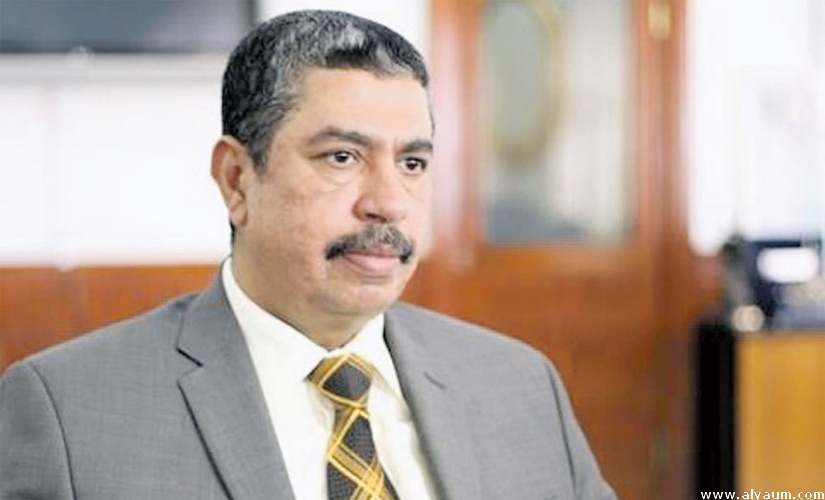
With the arrival of the Bahah government in late September 2014, the problem still exists and has worsened to a noticeable extent. Seven students on scholarships at King Fahd University in Saudi Arabia began to direct an appeal to the Minister of Higher Education, Dr. Muhammad Al-Mutahar, demanding the disbursement of financial dues to them from the Yemeni side in addition to their dues from the Saudi side. This is similar to the case of seven sons of officials and influential people under (the scholarship law and the decision
Minister of Higher Education, and the Committee for Delegations and Missions) and this was what was behind the dismissal of Al-Rubaie during the era of Minister Sharaf
Students are part of the same problem, and it is well known that financial dues for Saudi Ministry of Education scholarships are disbursed by the Saudi side in accordance with the Saudi Cabinet's law regarding scholarship students.
But financial corruption has a flavor among these people that you don't find among those supported by foreign governments and the private sector, where competence and integrity prevail.
Things continued this way until the outbreak of the war in Yemen in early 2015, when a new chapter in the suffering of Yemeni students began, with the Houthi group seizing control of their financial dues at the Central Bank. However, according to statements made by some students on scholarships in Jordan, the delay in disbursing their dues extended by weeks or days. In this regard, the legitimate government accused the Houthi group of full responsibility for the delay and the disbursement of a portion of those dues for what the group calls the “war effort.”
Despite this delay, there was no interruption in the disbursement of financial dues until the last government came to power, led by Bin Dagher, the man who had been in Saleh’s power before his defection, and who was the most knowledgeable about state affairs there. Here lies the most difficult chapter in the suffering, and perhaps the most difficult of the mysteries of this case finds its answer with Bin Dagher regarding the financial crisis that brought matters to their current state.
Ben Dagher's government... government promises of an urgent solution... silence from ambassadors and attachés... influential people and officials enjoy prosperity






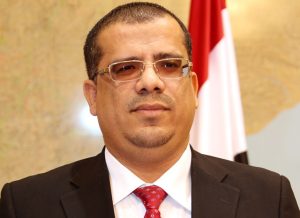
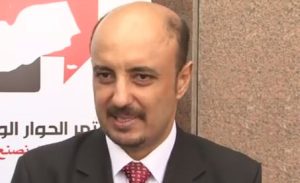


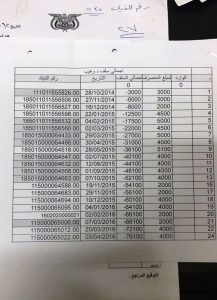
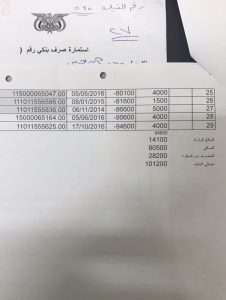
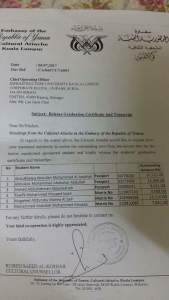

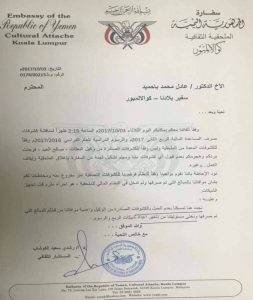
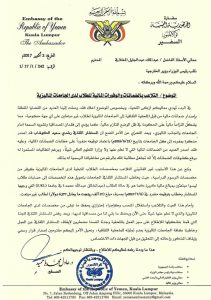
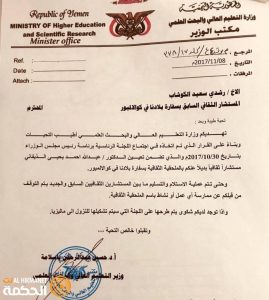
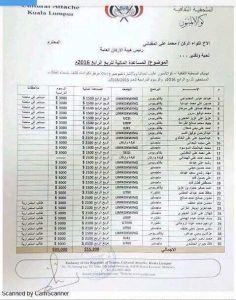
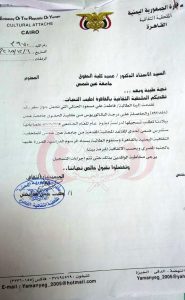
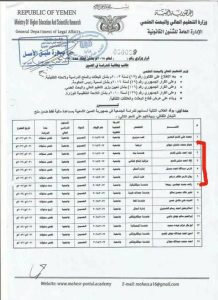
Dr. Ahmed Obaid bin Dagher arrived at the Prime Ministry on April 4, 2016, and the Minister of Higher Education, Dr. Hussein Abdulrahman Basalama, arrived on September 18, 2016. The date of their arrival was accompanied by the latest mission that marked a watershed moment in the intensification of the suffering of students abroad, and the emergence of a new surge in corruption. The transfer of the Central Bank from Sana'a to Aden in September 2016 also played a role, as all these events coincided within one month. Let us begin with a document revealed by the head of the Training Committee of the Yemeni Journalists Syndicate, Nabil Al-Asidi, about a military intervention by the Chief of Staff of the General Staff of the legitimate forces, Mohammed Ali Al-Maqdashi, who addressed his letter to the Cultural Attaché in Kuala Lumpur regarding the approval of financial dues for the fourth quarter of 2016. He expressed the twin corruption between the legitimate government and the Houthis. This list included the following names:
* Nephew of Major General Al-Maqdashi - Chief of Staff
* Sheikh Sagheer Aziz's son
*Saleh Shaaban's son - Minister of Finance in the Houthi government
* Son of Brigadier General Abu Bakr Al-Ghazali, Chief of Staff of the Republican Guard affiliated with former President Saleh.
* Son of Brigadier General Abbas Al-Madwahi, Director of Supply at the Houthi Ministry of Defense.
* The sons of Brigadier General Aziz Al-Hujairi, the former President Saleh's protection officer.
* Son of Brigadier General Sadiq Sarhan, Commander of the 22nd Infantry Brigade in Taiz.
* Son of Rushdi Al-Koushab - Cultural Attaché in Malaysia.
While investigating, and before we delve into the impact of the Central Bank's relocation from Sana'a to Aden, let's pause for a name that caught our attention. We investigated the details of his work, and found him on the list of corrupt officials. We also want to reaffirm that Yemeni embassies and their attachés play a role in increasing students' suffering. We also want to address Rushdi Al-Koushab, whose situation is unknown: is he a university student or a cultural advisor at the Yemeni embassy in Malaysia?
Nabil Al-Asidi published a document proving that Al-Koushab eats with both hands. The document dates back to September 25, 2017, when he ordered the disbursement of 2,000 Malaysian ringgit from the embassy account to the account of the student, “Rushdi Al-Koushab.” The document shows only his signature, without the signature of Ambassador Dr. Adel Bahumid.
But his corrupt partners were a group of students and other officials. A week after the dismissal, the decision came to dismiss Al-Koushab from his position and refer him for investigation, as stated in Ambassador Bahumid's memorandum to Yemeni Foreign Minister Abdulmalik Al-Mikhlafi.
What prompted Bahumid to take this step was that Al-Koushab had sent an official letter to the ambassador, requesting clarification of the students' financial dues, which had been disbursed without the attaché's knowledge, by order of the ambassador and his financial advisor.
If we return to the account of the scholarship student who explained to us the system of corruption between the scholarship applicant and the embassy, we find that explanation completely consistent with the documents we found proving the involvement of the Cultural Attaché in Malaysia in financial violations, as it disbursed financial dues to students not registered on the higher education rolls, in exchange for a share of the funds disbursed to undeserving students.
Some might say that the ambassador's interference in the cultural attaché's powers is illegal, in order to get the ambassador into trouble with partisan roots, but what saved the ambassador's interference was his implementation of the instructions for disbursement of the lists sent by the Undersecretary of the Scholarships Sector in Higher Education, Dr. Saleh Al-Abd, in addition to the minister's acknowledgment of the dismissal decision a month after its issuance, and also the fact that Al-Koushab was repeating the same problem against the financial advisor to the previous ambassador before Bahumid assumed his duties on 12/3/2016, as Al-Koushab was inciting students against the two ambassadors.
Some view the dismissal of Al-Koushab as an attempt to curb corruption, while others view it as a cover-up for the decision by the Minister of Higher Education and the Minister of Foreign Affairs to add 250 names to the list of financial dues. Al-Koushab rejected this move because it would exacerbate the financial crisis facing students, not to mention the fact that some of them are in financial difficulty.
There is a neutral party between the two parties, holding everyone responsible for the crisis. This has been proven against Al-Koushab, but what will come during the investigation will prove the other party's involvement in this crisis more clearly.
And if we go to the Cultural Attaché in Cairo, and with the attaché/Wahib Khuda Bakhsh, who applies the theory of “whoever protects is the one who thief,” where he claims that he is fighting the granting of scholarships to the children of diplomats, and this after his dismissal and referral to investigation, despite the fact that his wife was among those who were granted scholarships by his order, in addition to what some described as financial embezzlement that Bakhsh committed under the name of a “salary advance” in the amount of $80,000 from the students’ financial dues account.
Aden Net reported that the decision to appoint Bakhsh violates the Higher Education and Scientific Research Law, as he is a student who is failing in his doctoral studies, and the law prohibits the appointment of any student as a cultural advisor. In addition, he did not obtain his doctorate degree until nine years after his scholarship. The decision to send him abroad was canceled by the President of Aden University in 2014, and he did not obtain his doctorate until 2017 after being appointed as a cultural advisor at the embassy in Cairo.
So we have two Yemeni cultural attachés who were dismissed on the grounds of corruption, even though the corruption has not stopped yet.
Returning to the transfer of the Central Bank from Sana’a to Aden in September 2016 and its role in increasing the suffering of students, a video clip showed students from Jordan expressing their discontent about the delay in their dues for months, after the transfer of the Central Bank, in addition to stopping the dues of 115 scholarship students, as the total number of scholarship students in Jordan until 2017 is (587) male and female students, and the reward for a bachelor’s degree is: 1800$ for every 3 months, while for a postgraduate student: 2100$ for every 3 months, as the reward is paid every three months.
There has been an exchange of accusations between the Houthis and the legitimate government over who is responsible for this. Abdul Karim Al-Rawdhi, the Undersecretary of the Ministry of Higher Education for Scholarship Affairs in the Houthi government, known as the “National Salvation Government,” said: “As soon as the Central Bank moved to Aden, problems arose. They halted transfers, and this affected spending on cultural attachés and students abroad. Some receive payments, while others do not.”
Meanwhile, the Cultural Attaché to Jordan, Dr. Abdul Karim Al-Warafi, responded that the crisis did not arise suddenly with the Central Bank's transfer, but rather began with the relocation of Yemeni students from Syria to Jordan to complete their studies, fleeing the war that erupted there in 2011. He said, "The Syrian crisis has impacted the financial disbursements of Yemeni students transferred from Syrian universities to Jordanian universities, due to the years they receive in Jordan being equivalent to those in Jordan."
Of course, we must not forget the Yemeni embassy in Syria being outside the control of the legitimate government and the Houthis seizing students' dues.
Regarding the current situation, Al-Warafi blamed the Ministry of Finance for the delay in liquidity, as he stated in his speech during the student protests in front of the Cultural Attaché Office in late August 2016.
In an attempt to clarify the situation to the public, Minister of Higher Education and Scientific Research Dr. Hussein Basalama confirmed that what is happening is due to the ongoing war in Yemen, and that they are in the process of raising this issue with the Yemeni Prime Minister.
Moreover, Yemeni Deputy Prime Minister and Minister of Foreign Affairs Abdulmalik Al-Mekhlafi, in his meeting with Yemeni students studying abroad in Jordan on August 8, 2017, stated that the reason for the crisis was the government's difficulty in providing financial liquidity. He pledged to resolve the problems of Yemeni students studying abroad.
However, the clarification was denounced by the Undersecretary of the Ministry of Higher Education for Scholarships and Cultural Relations, Dr. Saleh Al-Abd Al-Awlaqi, who revealed the truth in a Facebook post dated January 14, 2018, where he said:
The committee investigating administrative and financial violations with the cultural attachés in Malaysia and Egypt aims to uncover the systematic looting of millions of dollars.
On the other hand, Al-Awlaki shows that corruption is based on its roots, as he said in his Facebook post on 1/12/2018:
The directives of His Excellency the President and the Prime Minister have gone astray, and the tables have turned. They want to close the door to scholarships for top students and open it wide to the children of the influential and the well-connected. I apologize, and publicly appeal to His Excellency the President and the Prime Minister to take the necessary measures to protect academic excellence.
Although Dr. Al-Awlaki returned five days later in another post to thank the Yemeni Prime Minister for removing obstacles to the grants for the top students, only three months had passed before Halima returned to her old ways. She revealed a new document dated April 2018 approving grants for the children of diplomats at the Yemeni Embassy in China, with the approval of Minister Basalama, and including the following names:
1- “Hiyam”, the daughter of the Yemeni ambassador to China (Mohammed Othman Dabwan Al-Mikhlafi)
2- “Lamia and Liqa”, daughters of Deputy Ambassador Ahmed Muthanna Qasim.
3- “Raif”, son of the cultural attaché, Mohammed Awadin Rabia.
4- “Rowan”, daughter of financial advisor Faris Taher Darham.
5- “Faris”, son of Consul Abdullah Sunbul.
He follows
Part Two




